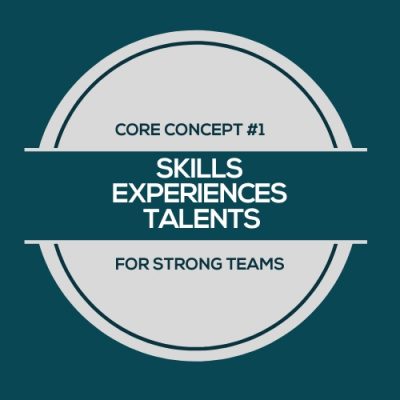Skills Experiences Talents (S.E.T.) For Strong Teams
Podcast: Play in new window
Subscribe: Spotify | iHeartRadio | Email | TuneIn | More

Let The Total You Shine: Skills. Experiences. Talents.
When it comes to career branding, people usually think showcasing their skills and experiences is enough. For the longest time, it's what we have seen others do: fill resumes and LinkedIn profiles the skills they've acquired along the way.
If that’s not enough, then what’s missing?
Oh, it’s just what we already have all along: talent!
StrengthsFinder views natural talent as the way we do things driven by the inherent way we think, feel, and act. When we add that to our list of skills and experiences, we are able to establish a more solid character behind our career brand. Yet how often do we really come across natural talents in LinkedIn profiles, resumes, and CVs?
Rarely.
For example, if you have Deliberative/Intellection talents, you can present them in your career branding effort as:
- Detecting risks that others overlook
- Dissecting on a topic with sensibility and depth
What is Talent Anyway?
The formal definition of a talent:
Your natural talents are how you think, feel, and act when you're at your natural best.
What's the formal definition of a strength? According to the Gallup organization (the creators of the CliftonStrengths tool):
Your strengths reflect your areas of near-perfect performance in how you get work done.
What if you read the words "near perfect" and think, "No way, that's too lofty. I'm not perfect, or anywhere near it." Don't worry, we're not aiming for perfection as a human. We're talking about ways you approach work when they reliably support your performance. They're your easy buttons. So how do you get there?
Your natural talents x your investment in your talents = your strengths
For example, if you have a natural talent of analytical and you never use it, it won't become a strength. It's an area of potential. Then, after you invest in it and mature it, it can become a towering strength for you. Let's say you apply this talent by turning skepticism into research that helps the team see truths no one else noticed - that's investing in the talent and using it to turn it into a strength.
Let's say you apply the Analytical talent by dissecting data with incredible pivot tables and leading indicators that no one else thought of. Then you present that data and aim it toward organizational goals. You're using your talent to contribute to the team. It's easy for you to do because it's what you'd do naturally, anyway - even if no one asked. This is how you turn talents into strengths. It's applying them and developing them toward a contribution.
Your Challenge: Shift From 1D (Skills) To 3D (Skills Experiences Talents)
Career branding without talents is merely a one- or two-dimensional view of yourself. To not showcase them is to deprive others the best of what you can give easily and naturally. We need all 3. Skills. Experiences. Talents.
Imagine how sturdier and more powerful your career branding would be if it’s standing not just on two but three solid legs. You have your skills, your experiences, and your talents. Now that sounds like a total package!
Once you start adding in your arsenal of talents, you can expect to get a better match for this newfound well-rounded version of you.
Your Team’s Game Plan
As you determine your team’s pool of strengths today, it’s important that you get a 3D view of each other. The key is that you're willing to put out a 3D view of yourself. Remember, 3D is S.E.T., which is Skills. Experiences. Talents.
This means going through the following steps:
- Think about your career brand vis-à-vis
-
- How you're known currently
- How you want to be known or remembered in the future
- Think about how to communicate to your team--your process of working through your natural talents.
- Mine natural talents and look for them from your teammates so you can…
-
- See how you can collaborate better
- Observe when they're doing what leads them toward their aspiration
- Celebrate it with them
The 'Aspirational You' As A Concept For Marketing Your Natural Talents
Here are examples of sets of words that the participants thought up as the aspirational representation of themselves.
- decisive, observant, bridge-builder
- trustworthy, inquisitive, excellence-seeker
- casual, decisive, influencer
- bold, forward-looking, listener
Of course, these examples are merely a guide on how you can come up with your own “Aspirational You” version.
Think well of how you want to be remembered as you move on from one role or career to another, and then find the right descriptive words that best capture you.
Examples:
- “People have told me I am ________.”
- My motto at work is ________.”
- or simply list down your StrengthsFinder talent themes.
Ready For The Next S.T.R.E.N.G.T.H.S. Core Concept?
The 9 Concepts:
- S: Skills, Experiences, and Talents
- T: Troublemaker Talents
- R: Regulate by Situation
- E: Easy Buttons
- N: Not an Excuse
- G: Gimme That Escalation
- T: Takes Time and Intention
- H: Honored and Insulted
- S: Starved and Fed
Carmie is a professional writer and editor at Lead Through Strengths. Having spent 8 happy years with a nonprofit child organization as a storyteller and sponsorship relations team manager, she continues collaborating with others across the globe for the joy of human development and connection. Her days are powered by coffee, curiosities, cameras (film and digital), music, notebooks, and a cat. Where books are home, she’s home. She calls her Top 5 StrengthsFinder Talents “CLIPS” (Connectedness, Learner, Intellection, Positivity, and Strategic)–you know, those tiny objects that hold connected things together. She’d like to think she’s one.

